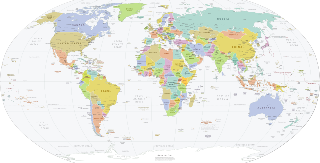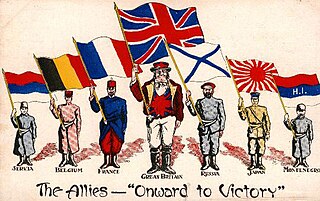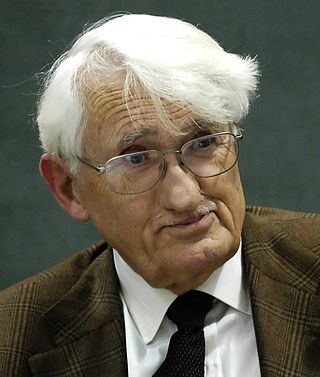Related Research Articles

A country is a distinct part of the world, such as a state, nation, or other political entity. When referring to a specific polity, the term "country" may refer to a sovereign state, states with limited recognition, constituent country, or a dependent territory. Most sovereign states, but not all countries, are members of the United Nations. There is no universal agreement on the number of "countries" in the world since several states have disputed sovereignty status, limited recognition and a number of non-sovereign entities are commonly called countries.
Nationalism is an idea and movement that holds that the Nation should be congruent with the state. As a movement, it presupposes the existence and tends to promote the interests of a particular nation, especially with the aim of gaining and maintaining its sovereignty (self-governance) over its perceived homeland to create a nation-state. It holds that each nation should govern itself, free from outside interference (self-determination), that a nation is a natural and ideal basis for a polity, and that the nation is the only rightful source of political power. It further aims to build and maintain a single national identity, based on a combination of shared social characteristics such as culture, ethnicity, geographic location, language, politics, religion, traditions and belief in a shared singular history, and to promote national unity or solidarity. Nationalism, therefore, seeks to preserve and foster a nation's traditional culture. There are various definitions of a "nation", which leads to different types of nationalism. The two main divergent forms identified by scholars are ethnic nationalism and civic nationalism.
A nation is a large type of social organization where a collective identity, a national identity, has emerged from a combination of shared features across a given population, such as language, history, ethnicity, culture, territory or society. Some nations are constructed around ethnicity while others are bound by political constitutions.

Romantic nationalism is the form of nationalism in which the state claims its political legitimacy as an organic consequence of the unity of those it governs. This includes such factors as language, race, ethnicity, culture, religion, and customs of the nation in its primal sense of those who were born within its culture. It can be applied to ethnic nationalism as well as civic nationalism. Romantic nationalism arose in reaction to dynastic or imperial hegemony, which assessed the legitimacy of the state from the top down, emanating from a monarch or other authority, which justified its existence. Such downward-radiating power might ultimately derive from a god or gods (see the divine right of kings and the Mandate of Heaven).
Hindutva is a political ideology encompassing the cultural justification of Hindu nationalism and the belief in establishing Hindu hegemony within India. The political ideology was formulated by Vinayak Damodar Savarkar in 1922. It is used by the Rashtriya Swayamsevak Sangh (RSS), the Vishva Hindu Parishad (VHP), the Bharatiya Janata Party (BJP) and other organisations, collectively called the Sangh Parivar.
An ethnicity or ethnic group is a group of people who identify with each other on the basis of perceived shared attributes that distinguish them from other groups. Those attributes can include a common nation of origin, or common sets of ancestry, traditions, language, history, society, religion, or social treatment. The term ethnicity is often used interchangeably with the term nation, particularly in cases of ethnic nationalism.
Germanocentrism is an ethnocentric and ethnonational ideology that places a strong emphasis on the cultural, economical, historical, political and social focus on Germanic peoples, often to the marginalization of other cultural elements. This concept has roots in various historical periods, including the 19th-century rise of German nationalism and the early 20th-century attempts to establish a unified German identity. It is essential to note that Germanocentrism is a complex and debated topic, with scholars offering different perspectives on its manifestations and impact.

American exceptionalism is the belief that the United States is either distinctive, unique, or exemplary compared to other nations. Proponents argue that the values, political system, and historical development of the U.S. are unique in human history, often with the implication that it is both destined and entitled to play a distinct and positive role on the world stage.
Sovereigntism, sovereignism or souverainism is the notion of having control over one's conditions of existence, whether at the level of the self, social group, region, nation or globe. Typically used for describing the acquiring or preserving political independence of a nation or a region, a sovereigntist aims to "take back control" from perceived powerful forces, either against internal subversive minority groups, or from external global governance institutions, federalism and supranational unions. It generally leans instead toward isolationism, and can be associated with certain independence movements, but has also been used to justify violating the independence of other nations.

National identity is a person's identity or sense of belonging to one or more states or one or more nations. It is the sense of "a nation as a cohesive whole, as represented by distinctive traditions, culture, and language". National identity may refer to the subjective feeling one shares with a group of people about a nation, regardless of one's legal citizenship status. National identity is viewed in psychological terms as "an awareness of difference", a "feeling and recognition of 'we' and 'they'". National identity also includes the general population and diaspora of multi-ethnic states and societies that have a shared sense of common identity identical to that of a nation while being made up of several component ethnic groups. Hyphenated ethnicities are examples of the confluence of multiple ethnic and national identities within a single person or entity.
Historiography is the study of how history is written. One pervasive influence upon the writing of history has been nationalism, a set of beliefs about political legitimacy and cultural identity. Nationalism has provided a significant framework for historical writing in Europe and in those former colonies influenced by Europe since the nineteenth century. Typically official school textbooks are based on the nationalist model and focus on the emergence, trials and successes of the forces of nationalism.

African nationalism is an umbrella term which refers to a group of political ideologies in West, Central, East and Southern Africa, which are based on the idea of national self-determination and the creation of nation states. The ideology emerged under European colonial rule during the 19th and 20th centuries and was loosely inspired by nationalist ideas from Europe. Originally, African nationalism was based on demands for self-determination and played an important role in forcing the process of decolonisation of Africa. However, the term refers to a broad range of different ideological and political movements and should not be confused with Pan-Africanism which may seek the federation of many or all nation states in Africa.
Comparative history is the comparison of different societies which existed during the same time period or shared similar cultural conditions.
The rise of the Western notion of nationalism in the Ottoman Empire eventually caused the breakdown of the Ottoman millet system. The concept of nationhood, which was different from the preceding religious community concept of the millet system, was a key factor in the decline of the Ottoman Empire.
Civic nationalism, otherwise known as democratic nationalism, is a form of nationalism that adheres to traditional liberal values of freedom, tolerance, equality, and individual rights, and is not based on ethnocentrism. Civic nationalists often defend the value of national identity by saying that individuals need it as a partial shared aspect of their identity in order to lead meaningful, autonomous lives and that democratic polities need a national identity to function properly. Liberal nationalism is used in the same sense as 'civic nationalism', but liberal ethnic nationalism also exists, and "state nationalism" is a branch of civic nationalism, but it can also be illiberal.

Constitutional patriotism is the idea that people should form a political attachment to the norms and values of a pluralistic liberal democratic constitution rather than to a national culture or cosmopolitan society. It is associated with post-nationalist identity because, while it is seen as a similar concept to nationalism, the attachment is based on the constitution rather than on a national culture. In essence, it is an attempt to re-conceptualize group identity with a focus on the interpretation of citizenship as a loyalty that goes beyond individuals' ethnocultural identification. Theorists believe this to be more defensible than other forms of shared commitment in a diverse modern state with multiple languages and group identities. It is particularly relevant in post-national democratic states in which multiple cultural and ethnic groups coexist. It was influential in the development of the European Union and a key to Europeanism as a basis for multiple countries belonging to a supranational union.

Macedonian nationalism is a general grouping of nationalist ideas and concepts among ethnic Macedonians that were first formed in the late 19th century among separatists seeking the autonomy of the region of Macedonia from the Ottoman Empire. The idea evolved during the early 20th century alongside the first expressions of ethnic nationalism among the Slavs of Macedonia. The separate Macedonian nation gained recognition during World War II when the Socialist Republic of Macedonia was created as part of Yugoslavia. Macedonian historiography has since established links between the ethnic Macedonians and various historical events and individual figures that occurred in and originated from Macedonia, which range from the Middle Ages up to the 20th century. Following the independence of the Republic of Macedonia in the late 20th century, issues of Macedonian national identity have become contested by the country's neighbours, as some adherents to aggressive Macedonian nationalism, called Macedonism, hold more extreme beliefs such as an unbroken continuity between ancient Macedonians, and modern ethnic Macedonians, and views connected to the irredentist concept of a United Macedonia, which involves territorial claims on a large portion of Greece and Bulgaria, along with smaller regions of Albania, Kosovo and Serbia.
National mysticism or mystical nationalism is a form of nationalism which raises the nation to the status of numen or divinity. Its best known instance is Germanic mysticism, which gave rise to occultism under the Third Reich. The idea of the nation as a divine entity was presented by Johann Gottlieb Fichte. National mysticism is closely related to Romantic nationalism, but goes beyond the expounding of romantic sentiment, to a mystical veneration of the nation as a transcendent truth. It often intersects with ethnic nationalism by pseudohistorical assertions about the origins of a given ethnicity.

Reactionary modernism is a term first coined by Jeffrey Herf in the 1980s to describe the mixture of "great enthusiasm for modern technology with a rejection of the Enlightenment and the values and institutions of liberal democracy" that was characteristic of the German Conservative Revolutionary movement and Nazism. In turn, this ideology of reactionary modernism was closely linked to the original, positive view of the Sonderweg, which saw Germany as the great Central European power, neither of the West nor of the East.
Ethnic nationalism, also known as ethnonationalism, is a form of nationalism wherein the nation and nationality are defined in terms of ethnicity, with emphasis on an ethnocentric approach to various political issues related to national affirmation of a particular ethnic group.
References
- George M. Fredrickson. "From Exceptionalism to Variability: Recent Developments in Cross-National Comparative History," Journal of American History, Vol. 82, No. 2 (Sep., 1995), pp. 587–604 in JSTOR
- Gallant, Thomas W. "Greek Exceptionalism and Contemporary Historiography: New Pitfalls and Old Debates," Journal of Modern Greek Studies, Volume 15, Number 2, October 1997, pp. 209–16
- Michael Kammen, "The Problem of American Exceptionalism: A Reconsideration," American Quarterly, Vol. 45, No. 1 (Mar., 1993), pp. 1–43 in JSTOR
- Seymour Martin Lipset, American Exceptionalism: A Double-Edged Sword (1996)
- Lund, Joshua. "Barbarian Theorizing and the Limits of Latin American Exceptionalism," Cultural Critique, 47, Winter 2001, pp. 54–90 in Project Muse
- Pei, Minxin. "The Puzzle of East Asian Exceptionalism," Journal of Democracy, Volume 5, Number 4, October 1994, pp. 90–103
- Thompson, Eric C. "Singaporean Exceptionalism and Its Implications for ASEAN Regionalism," Contemporary Southeast Asia, Volume 28, Number 2, August 2006, pp. 183–206.